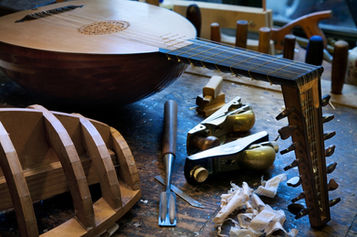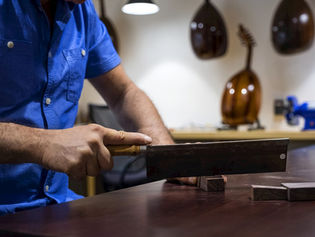

Project Name:
Start Date:
Goals:
Partners:
Arab Oud House
1998
Spread the culture and awareness of the importance of the Oud and other Arabic musical instruments
Abu Dhabi Commission for Culture and Tourism, Cairo Cultural Development Fund, Al Hunthal Group
THE IDEA

Arab House was not just a hollow idea, nor was it just a desire to establish a school that might have dozens more.
I was a student at the Institute of Phonological Studies when my students and colleagues found me overloaded with a large number of lessons every day that might help us in many aspects but in another way that reduces the possibilities of achieving our talents in a remarkable and decent manner.
I saw the day moving quickly and I review the theoretical lessons and do not remain in front of me for practical lessons only a little time I try to steal from the times of Rahti.
I then thought about what could hurt us as students if we went all out of our talents and desire to achieve ourselves in a particular field, such as that we specialize in one side of the Oud and in my case was in the study of different technology of the Oud is my first goal.
After graduating from the Institute of Phonetic Studies in Baghdad and during my work in teaching in the same period in which I was studying, I began to understand the idea that the student will specialize in the whole machine in which he loves in such a way that the theories of music are intertwined in playing the oud, Can be called Oud knowledge through the possession of the techniques of playing and different schools on the oud so that the student can create a methodology for research according to his vision and help him to search in books and not to rely on pre-prepared and prepared any development of the development and discovery inside and outside the soul in which theoretical lessons From The dimensions applied lessons, and not vice versa
The large number of theoretical lessons was a barrier between many students and the possibility of achieving their projects in owning the corner of the machine, but some students of the music lovers found themselves and moved away little by little and accused their dreams.
The House project is to create and achieve the dream with all the necessary science to become an ambitious student project for a soloist.
Naseer Shamma
BEGINNINGS
Naseer Shamma started the establishment of the Oud House in Tunis in 1993. The first branch of the Oud House was officially launched in 1998 by the Egyptian Opera House in Cairo with the support and encouragement of the creative opera artist Dr. Ritaiba El Hefny. It was the first dedicated Oud school,
The Arab Oud House has gained fame and reputation as a teaching school for Oud, especially after opening several branches in different parts of the world. The most recent was the Oud House in Abu Dhabi and Alexandria. Naseer Shamma also seeks to open in several Arab and Western cities including Khartoum and Berlin. All branches of Oud House.
With the launch of Oud House projects over time, it has attracted a growing number of young men and women seeking soloist certificates, professional certificates and teaching musical instruments. The House of Oud in Abu Dhabi is the focus of this renaissance witnessed by Arabic music; it enjoys all the factors of success as a cultural, creative and creative project, including facilities and cadres.

GOALS


• Spreading culture and awareness of the importance of the Oud and other Arabic musical instruments.
• To highlight the importance of instruments: oud, law, flute, bezek, cello, violin, Arabic singing, and rababa as an integral part of Arabic music and its schools.
• Teaching techniques of playing musical instruments mentioned above, and other oriental musical instruments. And facilitate the understanding of diverse music schools.
• The formation of a new generation of professional musicians and the formation of an Arabic music group;
• Teaching the manufacture of musical instruments of different sizes.
• Publish research on the oud machine in particular, and Arabic musical instruments in general in different cultures.
• Graduates of world-class musicians specialize in playing these instruments.
• Highlighting musical performances and projects related to musical instruments taught at Beit Al Oud.
• Preserve the heritage of Arabic music, and find the appropriate methods to develop and update.
• Graduation of teachers and specialists in musical instruments mentioned above.
THE STUDENT PROGRAM
• Beit Al Oud's curriculum is based on the study of various techniques of playing using the skills and methods that qualify the student to deal with the musical compositions, schools of different music and their symbols.
• The student is trained until he has a good level of experience in the techniques of playing his musical instrument, which will become a professional player.
• The student receives experience and knowledge in various musical theories.
• Inspiring students: by hosting guest play teachers and sharing their experiences and experiences with members of the House of Oud.
• Participation of members of Oud House in concerts after a period of training and rehearsals.
• Qualifying outstanding students to join the faculty after successfully completing two years of training, in addition to the study period, which includes 5-6 semesters.
BRANCHES
PERFORMANCES
Of the Arab Oud House and its long line of achievements was also born the Arab Oud House Orchestra, a filtering you may call it of all the masters that have climbed in the ranks of musical theory and its practice, students that have graduated from the house's branches and been given the chance to highlight their talents alongside their colleagues. The orchestra is lead by Shamma and has performed in many capitals across the world, with noticeable events such of that of Baalbak, Lebanon in 2010, Riyadh, Saudi Arabia and Barcelona of Spain in 2018.
The bringing together and presented harmony of 35 musicians with the Oud and all of its instrument family: the Oud Cello, Oud Double Bass, Saz, and of course the traditional Oud. Gives audiences a rare chance to witness traditional Arabic music in an unprecedented manner.



























